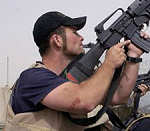 With the federal government closed by snow, it’s a slow day for export news, which gives me the opportunity to plug “Unlikely Allies” by Joel Richard Paul. The book which reads like a novel of eighteenth-century intrigue recounts the true story of America’s first arms-broker, Silas Deane. Professor Paul, who teaches at UC-Hastings Law School, has written a book about arms-smuggling, intrigue in the Court of Versailles, duplicity, espionage and the most-unlikely cast of characters you might encounter outside of, say, a Mozart opera.
With the federal government closed by snow, it’s a slow day for export news, which gives me the opportunity to plug “Unlikely Allies” by Joel Richard Paul. The book which reads like a novel of eighteenth-century intrigue recounts the true story of America’s first arms-broker, Silas Deane. Professor Paul, who teaches at UC-Hastings Law School, has written a book about arms-smuggling, intrigue in the Court of Versailles, duplicity, espionage and the most-unlikely cast of characters you might encounter outside of, say, a Mozart opera.
In fact, one of the key characters, Beaumarchais, is best known to history as the playwright of The Barber of Seville and The Marriage of Figaro. He also, it seems, dabbled in arms-smuggling, hatching a plot to smuggle French weapons to the Continental Army by transshipping them through a Caribbean island. Another unlikely character in the tale is the Chevalier d’Eon, a French military hero rumored to be a woman. And finally there is Silas Deane, a plain-spoken Connecticut merchant and delegate to the Continental Congress, who spoke not a single word of French but was sent to Versailles to solicit armaments and aid from the French.
So, if you’re looking for a good read over the holidays, pick-up Unlikely Allies, either in dead tree format or for your eBook reader of choice (Sony Reader, Nook, or Kindle).
(Note: the links in this post are not affiliate links and I don’t receive anything if you click through and buy the book at any of them. This is just another value-added service of Export Law Blog for its loyal readers.)

 Posted by
Posted by  Category:
Category: 


 An
An  The exquisitely-monikered and equally notorious Monsieur Jacques Monsieur (or Mister Mister as he is affectionately known here)(pictured on the left) was nabbed last Friday when he arrived in New York and then sent to Mobile, Alabama, to face charges that he conspired to export F-5 jet engines and parts to Iran. In February 2009, Monsieur allegedly contacted an undercover U.S. agent looking for F-5 engines and parts. He then met with the undercover in both Paris and London.The indictment alleges that after those meetings, in July 2009, Monsieur wired $110,000 to an account in Mobile, Alabama, in payment for F-5 parts, and the rest, as they say, is l’histoire.
The exquisitely-monikered and equally notorious Monsieur Jacques Monsieur (or Mister Mister as he is affectionately known here)(pictured on the left) was nabbed last Friday when he arrived in New York and then sent to Mobile, Alabama, to face charges that he conspired to export F-5 jet engines and parts to Iran. In February 2009, Monsieur allegedly contacted an undercover U.S. agent looking for F-5 engines and parts. He then met with the undercover in both Paris and London.The indictment alleges that after those meetings, in July 2009, Monsieur wired $110,000 to an account in Mobile, Alabama, in payment for F-5 parts, and the rest, as they say, is l’histoire.


